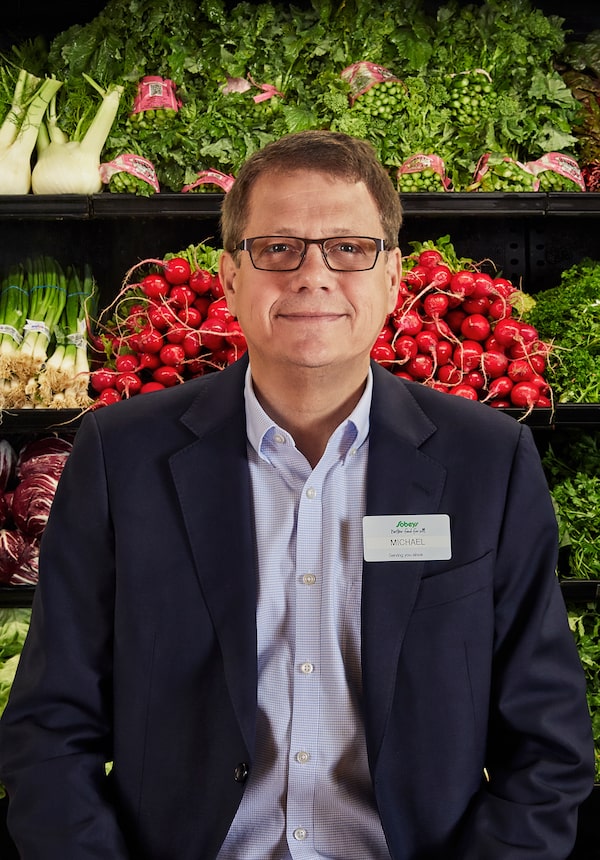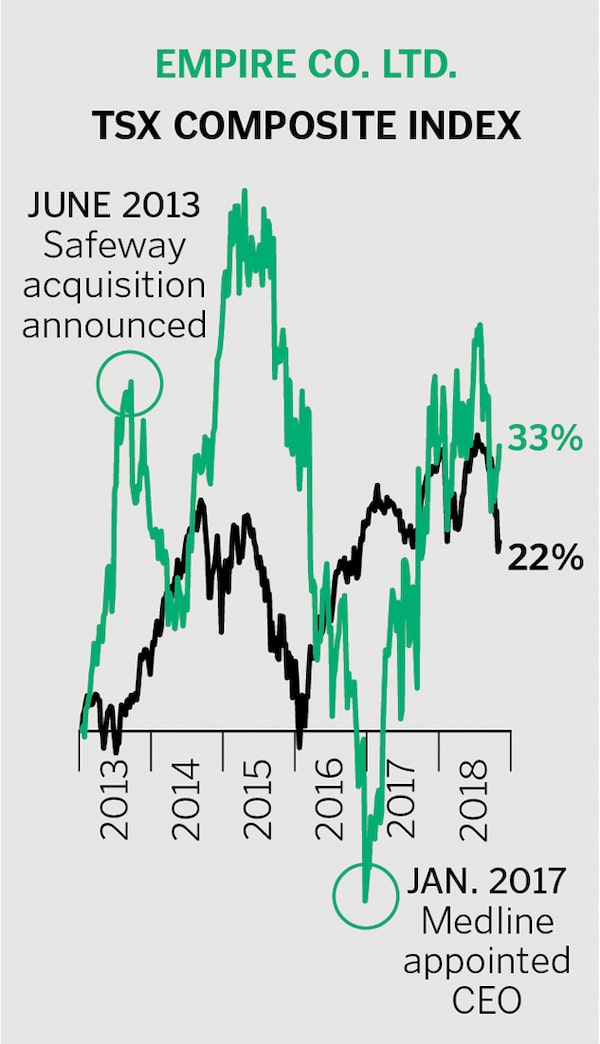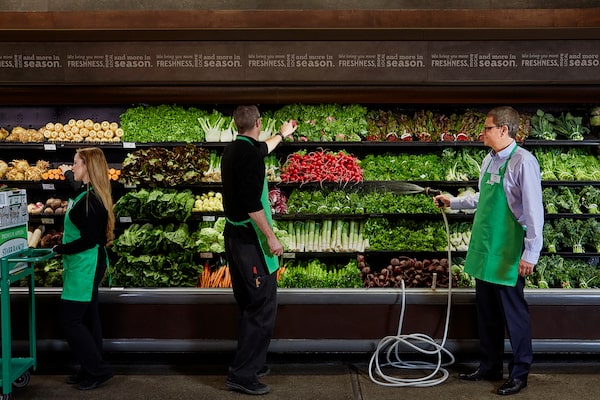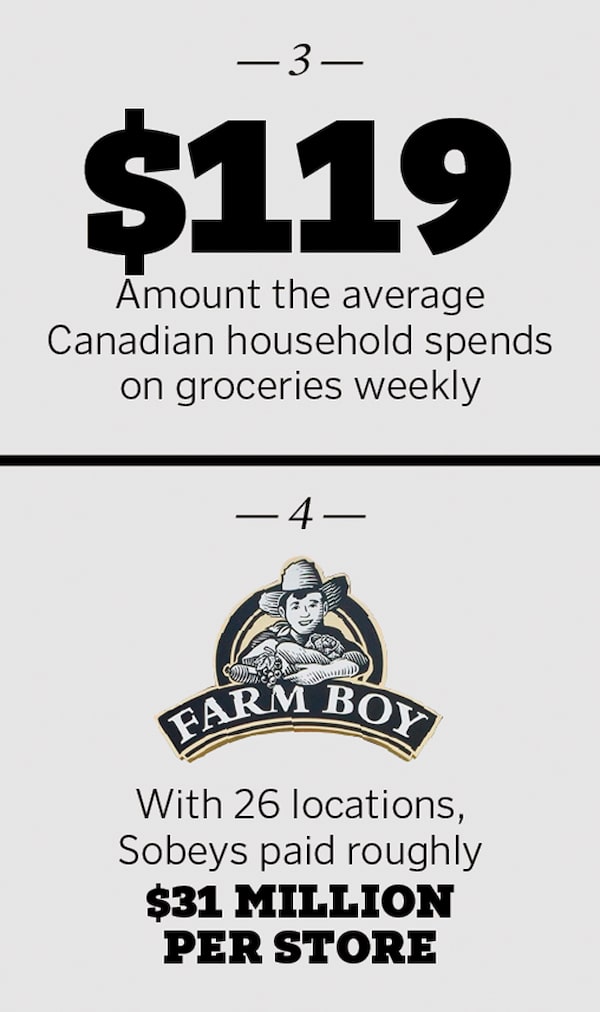
Jeremy Kohm/The Globe and Mail
Michael Medline assumed the helm of a grocery chain in crisis in January 2017. Four years earlier, Sobeys Inc., which is based in Pictou County, Nova Scotia, had paid a staggering $5.8 billion to push into Western Canada by buying almost 200 supermarkets from Safeway Canada. But Sobeys bungled the integration. Products went missing from shelves, lettuces wilted and customers abandoned Safeway in droves.
By 2016, Sobeys's parent, Empire Co. Ltd., was forced to write down more than half the Safeway purchase price. CEO Marc Poulin, who had orchestrated the takeover, was turfed that July. Six months later, Empire made a big bet on Medline, who had been pushed out as CEO of Canadian Tire Corp. A key difference was that Canadian Tire had been performing well, while Sobeys was ailing.

Medline got to work quickly. In May 2017, he unveiled a sweeping cost-cutting effort, dubbed Project Sunrise, which aims to generate $500 million in annual savings within three years. Then he announced an expansion of the company's Ontario discount chain, FreshCo, to Western Canada.
In January, Sobeys said it was teaming up with British e-commerce giant Ocado Group PLC to introduce high-tech online grocery shopping, starting in the Toronto area in 2020, then in other cities. In September, Empire agreed to buy Ontario-based natural foods supermarket chain Farm Boy for $800 million—an initiative Medline dubs “Project Fastball.”
Just two years after his arrival, Empire’s share price has rebounded by 56%, and the rejuvenation efforts are going faster than the 55-year-old Medline anticipated. There is still a long way to go, of course. But put all his accomplishments so far together and they gave Report on Business magazine plenty of reasons to name him our top CEO for 2018. In a refurbished Sobeys store in Toronto—his go-to supermarket over the past decade—Medline expounded on his strategy, his ups and downs, his approach to work (“I never stop, right? I’m persistent”) and the pain of losing his job at Canadian Tire (“Boy, did I miss it”).
So, this is your store. Is it close to your home?
I love this store. I've been shopping here for over 10 years now, so well before I joined Sobeys. Do you want to grab a table?
Someone told me you dropped the machine that does the fresh-squeezed orange juice. Or has it moved?
It did move. I once had to ask where it was.
What was your mandate when you were hired as CEO?
It was a troubling time. We had lost our way with customers. Remember, too, this is a 111-year-old grocer (see note 1). We were losing market share—over the four years before I joined, we lost almost $4 billion worth of business [based on the estimated dollar value of the company’s loss in market share]. (2)

I separate things simply: sales, margin and cost, and how much you invest in the business. We were struggling in all three and investing a lot. You can’t fix everything right away and have everyone flock back into the stores. What we could do first was stabilize margins, which were all over the place.
What was the toughest thing about the turnaround?
Morale. When a company is struggling, it's a dark tunnel and you can't see how to get out. The first two weeks, we went on a tour of the country, meeting people who worked in stores and offices. It was a listening tour, but somewhere around the middle of it, I started talking. There was no time for a year-long study.
How did you deal with morale?
I told people how great they were. At the time, I was also reading a book on Frank H. Sobey, our founder, who was an unbelievable leader. I didn’t want to throw out the history. I like to stand in the future and tell people how it will feel. I remember my first company Christmas party in Pictou County. It’s in an arena. This is right up to the announcement that we’re going to downsize offices and make some tough decisions. We were letting go of some really great people. I put away the script and spoke from my heart. I knew we would come out of it a strong company. And people reacted with such enthusiasm. It was the most emotional time in my business career.
Why do you think the turnaround has gelled quickly?
A few things helped. I think it's easier to make change when it's more existential. You can convince people more easily to do things when you've had a few years of getting pushed around a bit. There's also this awesome culture of humility and service emanating from the Sobey family that was waiting to be lit up again.
What about your customers? What were you hearing from them?
It depended where they were.

'I didn’t want to throw out the history,' Mr. Medline says of turning around company morale. 'I like to stand in the future and tell people how it will feel.'Jeremy Kohm/The Globe and Mail
How about in the west?
They were still upset about many of the changes to the private label and the loyalty program after the Safeway acquisition. While you're looking for cost savings and synergy, you don't take away what customers love. When you break trust, they start looking at you and your competitors differently. Safeway has the best locations, but we had broken trust, which we are slowly getting back.
Did you speak with customers?
I said, “Okay, send me all the customer letters now. I don’t want you picking and choosing.” Then I would phone some customers, which I think surprised them. But they opened up. People have an emotional connection with their favourite retailers. You might shop at a hardware retailer four to six times a year. At a grocery store, you could be shopping there 50 to 100 times a year. (3)

Let’s move to the Farm Boy acquisition. Why such a steep price?
The reason we paid such a healthy multiple for Farm Boy is that it’s worth it (4). We didn’t go to our board first and say, ''We’ve got to buy Farm Boy."
We went to them with a strategic plan about a year earlier saying, among other things, we needed a more urban-suburban banner to compete.
How did you get this Empire-Sobeys job? You hadn’t done grocery retail in the past.
I left my previous job in July 2016. Between Labour Day and Christmas, I had about 300 breakfast, lunch or dinner meetings with people—bank presidents, people at the biggest real estate companies and retailers. It allowed me to have conversations that I don't have now because I'm part of an organization. There were a bunch of opportunities, but I knew Empire Co. and Sobeys were searching for a CEO. I'd had the pleasure of getting to know Bill McEwan (5), who was a previous CEO and a wonderful leader. It was, in many ways, my dream job.
What was the interview process like?
They had to make a big decision. There are five members of the Sobey family on the board. They're such down-to-earth people—they think about the customers, and they all came through the business. When your name is on the store, you want to be proud.
How did you get up to speed?
Unbeknownst to the board interviewing me, I went across the country doing my due diligence. I remember flying out for a weekend and visiting stores in Alberta. I was a little perturbed at some things I saw—I was a Sobeys customer here in Ontario, but I wasn't as familiar with Safeway. I also went to Quebec. I'd lived there years before, and I knew IGA.

What’s it like to work with the Sobey family?
As a family, they own 92.7% of Empire's voting shares, but they treat it as a public company. It's a very independent board of directors run by the best chairman you could ever meet: Jim Dickson.
How does it compare with the Canadian Tire board and your experience there with the Billes family?
Well, the obvious difference is that there are just two Billeses. They control the voting stock. I'm not going to say much about that experience (6), other than it's a thrill to work for the Sobeys, and they know the company.
Can you tell me why you left Canadian Tire? Was it the digital strategy that the board felt was not working? Or a big U.S. e-commerce acquisition you wanted to do?
I don’t know, because we were doing really well. The stock price was strong. We were making great inroads on the brands and customers. We were being disruptive with technology. I saw a lot of positive change. So, their loss.
Were you ever given a reason?
No, no, no. I can't say I was.
It’s general knowledge that you were pushed out. How did you come to terms with that?
It was very tough. I took a month off and didn't talk business. I went somewhere where you can walk a beach, play tennis and be with your kids.
I take it you loved your job.
I loved being part of a team. I always say I'd be a good bee in a hive, or a good ant in an ant colony. Boy, did I miss it—that common goal, trying to achieve things.
Now that you’re turning around a large company (7), do you feel vindicated?
No, because I've never felt not vindicated. I gave the best I had everywhere I've worked.

You had left Canadian Tire before—in 2010. It was announced. You were head of dealer relations and the automotive division, and the company said you had other career aspirations.
I did. I'd been at the Tire about 10 years. I didn't want to sneak around and look for a job while I had a job. I gave in my pass card, my keys and my office. I think my friend Glenn Butt got my office. But I only left for, I think, a day or three days or something.
What happened? It was announced in August, but you weren’t supposed to leave until October.
Most people bugger off. I hung around and I said, ''If you've got any work—you're paying me—give it to me." And they asked me to look at whether we should purchase Forzani Group—Sport Chek, Sports Experts and other chains. (8) I always thought we should buy it, but the timing hadn't been right. They said, ''While you're looking for another job—now it's public—will you work as a consultant for us?" I think people thought, Why is this guy hanging around like a bad smell? Before we announced the acquisition, the board asked me if I would run Forzani if we bought it. So, I never really left.
Were you in line to be CEO in 2009 and then they chose Stephen Wetmore? (9) Were you disappointed?

Yeah, sure. But sometimes you look back later and figure you weren’t ready anyway. I think the board was smart not choosing me that time. And you need a little humility. I’ve learned it takes a team of great people.
Can you talk to me a bit about the Sobeys head office in Stellarton, Nova Scotia? (10) I read Sobeys has two corporate jets. (11) Is that how you get there and other places?
Sometimes. A lot of the time. I guess because I'm all over the country.
What’s it like to have the head office there?
It's a dream. There's a house on the water that was Frank H. Sobey's home. It's not a mansion or anything. I get to stay there and sleep in the bedroom of the person who made Sobeys an empire. And it's a 10-minute drive from the office. Even though I live in Toronto, I only spend about two days a week in the office here. The more you can get the team on the road visiting stores, the better.
Let’s switch gears. Which person has inspired you the most in your business career?
My dad, because he was always inquisitive. He's a doctor. I had a dream of going into medicine when I was young. But that got kiboshed in my high school chemistry class. I loved business as soon as I was exposed to it. I was a securities and corporate lawyer. I was at a great firm, McCarthy's, for two-and-a-half years or something. But every time I'd meet with a company, I wished I was working at the company.

Were there any other big early influences in your life?
I was at the world's largest newsprint manufacturer, Abitibi-Price. It was the greatest run company in the worst business you could possibly be in. Ron Oberlander, the CEO, was a genius. (12) I've never had someone be so hard on me in my life, and he was my mentor. Near the end of his life, he was my best friend. It was a funny relationship, and we lost him very young—like 60 or 61—to cancer.
What’s your leadership style?
I never stop, right? I’m persistent. I’m thinking in the evening and on weekends about the business. Especially when turning around a company. I like to be strategic and act. In this world, you have to act very, very fast. If I have any strength, it’s to surround myself with people who are smarter than I am, and push them and get them excited.
Do you delegate?
It can confuse people sometimes. You have a sandbox. We put you in that position for a reason. Be innovative, excite the customer and take some risks. But once in a while, I'm gonna come in and see what's going on. It's part of my leadership style. As I've got older, I've gotten better at explaining to people what I'm doing. I'm pretty all over the business.
What mistakes have you learned from at Empire, Sobeys and Canadian Tire?
Early in your career, sometimes you don't surround yourself with the best team. You think, That person is good. I can work with them. Or, They'll get better over time. I've gotten far more demanding. I tend to make changes to the team more than most leaders.
You’re gearing up for the launch of Ocado in 2020. (13) But your competitors are moving fast. Will Sobeys fall behind in e-commerce?
This is exactly what we had to think about. By the way, we have a big e-commerce offering in Quebec and in Thrifty out west. But we decided it would take two years to get the best solution in place. Let everybody else pick inefficient and not very customer-friendly ways to build market share. It is frustrating to wait, but we are coming with a knockout punch. The CFCs [customer fulfilment centres] are the most modern robot-driven facilities.

Who is your most effective competitor?
Amazon is the greatest competitor any retailer will ever face. Amazon has made everyone better. But I think the Ocado solution is better than Amazon, at the end of the day.
What about Loblaw and their Shoppers Drug Mart stores becoming e-commerce grocery depots?
I think that was a very smart acquisition. Personally, I have a problem with buying food where people are going because they are not feeling great. But I think they've done a pretty nice job of putting a bit of grocery—not a great selection—in their stores.
You’ve had a lot of tension with Loblaw CEO Galen G. Weston over the bread pricing scandal. (14) You accused him of throwing competitors under the bus, and you even threatened to sue him. Why did you feel so strongly?
It’s about as strongly as I’ve ever felt about any issue. There is, at this point, absolutely zero evidence that we or many of the other food retailers were involved in any behaviour we are accused of. Reputation is everything—personal reputation and business. Here, 120,000 people work for that. I respect the Competition Bureau a lot. They’ve asked us to supply them with everything. After millions of documents and searches, we’re not aware of anything we’ve done wrong. I think we and maybe others—they’d have to speak for themselves—were brazenly thrown under the bus for doing things that we are not aware we did.

Sobeys is planning to launch FreshCo in the West. What have you learned from the chain in Ontario?
We started experimenting with four stores in London. Right now, FreshCo is booming in Ontario—strongest growth in years. (15) The pilot stores in London are doing even better.
Give me some examples of what you’ve done.
One thing customers told us is that the stores looked too nice for a discounter. So now the colour is going to be different. The logo was a white-and-black facade—now it's off-green. In the ''o" in FreshCo, there's an arrow pointing down to indicate prices going down. (16) Far more call-outs in terms of deals—there's a whole aisle of deals in the store. We've reduced the number of items and are more competitive on price than we were.
Tell me a bit about your family. How do you keep balance in your life? Is that really possible in your position?
I have a wonderful spouse who’s a history teacher. And I have four kids, the last of whom just went off to university this year. I don’t really talk about balance or separating. I love all aspects of my life. But I need respites. I love playing tennis. I love reading. I don’t read business books because I don’t find them that helpful. But the most relaxing thing—the only time I might not have work in the back of my head—is to go to a Leafs or Raptors game.

What was the last book you read?
Oh, my God. The latest Michael Lewis one. What's it called?
The undoing one?
Yeah. No, no.
The Fifth Risk?
Yeah.
For you, being a CEO is almost 24-7. How does that work with your wife?
She’s known me for quite a while—we dated in high school and got together later in life. She kind of knows what makes me tick, and I kind of know what makes her tick. We spend a lot of time together, but we have our own interests.
What’s your advice for other CEOs going through turnarounds?
You’ve got to give everything in a turnaround. It’s not a part-time job. You have to have a supportive board. And you’ve got to go for it.
Editor’s note: This version has been updated to clarify that Michael Medline’s statement that Sobeys lost $4-billion worth of business in the four years before he joined the firm was referring to the estimated dollar value of the company’s loss in market share.

This story appears in the December 2018 issue of Report on Business magazineJeremy Kohm